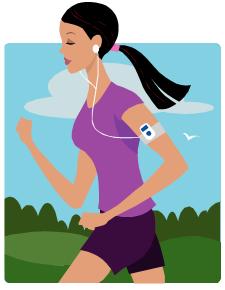Clinical Evaluation of the Diaton Tonometer: Comparison with Contact and non-Contact Tonometry.
Regular use of traditional dietary spices such as turmeric in one's cooking may be important for glaucoma patients. The use of complete spices (e.g., turmeric rather than curcumin, which is an isolated fraction of turmeric) is important as well as the use of multiple complimentary spices according to long-established wisdom such as found in Ayurveda. Still, the research backing up anti-oxidant properties of turmeric is a useful read.
If the email we send to your email address is returned with a failure message (e.g., Delivery Status Notification Failure or similar), our administrator(s) will block your account from logging in to FitEyes.com. There are other similar reasons we sometimes block accounts. We do all of this to keep spammer from having access to FitEyes.com. As you may notice, FitEyes.com is 100% free of spam and we hope to keep it that way.
If this happens to you by mistake and you would like your account unblocked, simply contact us and we will remove the block.
 There is a New York Times article entitled "Lactic Acid Is Not Muscles' Foe, It's Fuel" By GINA KOLATA published on May 16, 2006. I just read it today. The article is about recent discoveries in exercise physiology. It turns out that the accepted scientific understanding of a fundamental aspect of exercise was wrong for more than 80 years. It ends with a quote by Dr. Brooks: "The scientists were stuck in 1920." He's talking about the entire field of exercise physiology!
There is a New York Times article entitled "Lactic Acid Is Not Muscles' Foe, It's Fuel" By GINA KOLATA published on May 16, 2006. I just read it today. The article is about recent discoveries in exercise physiology. It turns out that the accepted scientific understanding of a fundamental aspect of exercise was wrong for more than 80 years. It ends with a quote by Dr. Brooks: "The scientists were stuck in 1920." He's talking about the entire field of exercise physiology!
Even when the mistake was shown by good research, the entire field continued to fight against Dr. Brooks's discoveries for decades. In some ways it reminds me of the fight against new tonometers such as the Ocular Response Analyzer and the Pascal Dynamic Contour tonometer that we see in ophthalmology now.
In my experience, science (as typically practiced) is wrong so much that I think people who maintain a predominantly scientific (i.e., materialistic) world view are disadvantaged. For example, the article says, "Coaches have understood things the scientists didn't." That is almost always the case in almost every field at all times.
The people who are "in the trenches" understand things scientists don't. Now this isn't to say that the scientific method is bad or that data-driven methodology should be discarded. Good coaches rely on a ton of data and they have excellent observation skills. They do have a scientific approach. The difference is they are not limited by a dogmatic scientific materialism.
Furthermore, the practice of science in today's world is so wrapped up with ego, power, career advancement and money that the altruistic aims of science get pushed aside. And new discoveries get trampled by established scientists who want to hold on to their positions of power and prestige.
BY Babak A. Parviz // September 2009
The human eye is a perceptual powerhouse. It can see millions of colors, adjust easily to shifting light conditions, and transmit information to the brain at a rate exceeding that of a high-speed Internet connection.
But why stop there?
By Doug Macron
Spanish RNAi drug shop Sylentis expects to dose the first patient in a phase I study of its glaucoma-associated ocular hypertension drug SYL040012 in Spain around the end of September, a company official confirmed to RNAi News this week.
The disclosure comes about a month after the company announced that it had received clearance from Spanish regulators to begin the trial, in line with its previously disclosed guidance (see RNAi News, 2/19/2009).
Oral consumption of Ginkgo biloba led to a higher survival rate of optic nerve cells (retinal ganglion cells). The effect was dosage-dependent - the higher concentrations of Ginkgo resulted in higher optic nerve cell survival rates. The dosages of Ginkgo were comparable to those an average person could safely consume.
Dosage dependence of the effect of Ginkgo biloba on the rat retinal ganglion cell survival after optic nerve crush - Abstract
 Purpose: To assess the dose-response relationship of vigorous physical activity (running distance, km·d-1) or cardiorespiratory fitness (meters-per-second pace during a 10-km footrace) to the risk for incident glaucoma.
Purpose: To assess the dose-response relationship of vigorous physical activity (running distance, km·d-1) or cardiorespiratory fitness (meters-per-second pace during a 10-km footrace) to the risk for incident glaucoma.
Conclusions: These data provide preliminary evidence that vigorous physical activity may reduce glaucoma risk, which, in the absence of medical record validation, could represent ocular hypertension in addition to frank glaucoma. Additional follow-up with validation is needed to identify the type of glaucoma affected.
See full text article attached.
Read the summary of University of Melbourne's Department of Optometry and Vision Sciences study on an association between dietary omega-3 fatty acid intake, age, and intraocular pressure. Another proof of beneficial effect of taking fish oil to strengthen and support healthy eyes and vision.
For dry eyes, here are some things to consider:

Consume more Omega-3 fatty acids (and less Omega-6 fatty acids). Ideally the ratio between these two types of fatty acids in your diet should be around 1:1. In the typical western diet, people consume 20 times more Omega-6 fatty acids.The Omega-3 fatty acids can decrease the viscosity of tears and normalize the function of the tear glands. Sources of Omega-3 fatty acid in your diet include walnuts and soybeans.
 Background
Background
With the increasing number of people participating in physical aerobic exercise, jogging in particular, we considered that it would be worth knowing if there are should be limits to the exercise with regard to the intraocular pressure (IOP) of the eyes. The purpose of this study is to check IOP in healthy and primary glaucoma patients after aerobic exercise.
Methods
You will need three items to get started:
The Pfizer MAINTAIN program helps eligible people in financial need continue to get their Pfizer medicines — including the glaucoma drug Xalatan® — if they have recently become unemployed and do not have prescription coverage. Beneficiaries of the program will get their Pfizer medicines for free for up to a year or until they become re-insured (whichever comes first).
Eligibility
Individuals and their immediate family members are eligible for this program if:
There was an interesting article on BBC today about recent advances in neuroprotection for glaucoma. Here are some highlights from the article:
 Lead researcher Dr Stefano Bonini said: "Although neuroprotection in glaucoma has already been attempted with several compounds, this is the first time that an improvement in visual function is observed in patients with advanced optic nerve damage."
Lead researcher Dr Stefano Bonini said: "Although neuroprotection in glaucoma has already been attempted with several compounds, this is the first time that an improvement in visual function is observed in patients with advanced optic nerve damage."
David Wright, chief executive of the International Glaucoma Association, warned against drawing firm conclusions from such a small study - but said the results were encouraging.
He said: "There have been many false dawns in the search for neuro-protective agents for the treatment of glaucoma and it is a feature of research on other compounds that early promise does not always translate into clinical effectiveness when larger studies are undertaken.
"However, this research would seem to indicate both effectiveness and acceptability as to the means of drug delivery.
"If these early indications are carried through to wider trials and there are no other problems, then this has the potential to open a completely new method of treating glaucoma and of preventing unnecessary visual loss in the future."
I just read this news item:
http://news.bbc.co.uk/2/hi/uk_news/8172690.stm
There is no doubt using a sunbed or sunlamp will raise the risk of skin cancer, say international experts.
Previously, the International Agency for Research on Cancer (IARC) assessed sunbeds and sunlamps as "probably carcinogenic to humans".
But it now says their use is definitively "carcinogenic to humans".
Many people with vision problems are eagerly awaiting better computer monitors. The ideal monitor would be based on reflective technology (meaning it doesn't emit light), allowing you to read it in normal daylight or even bright sunlight. Ebook readers generally use this technology, but computer monitors do not.
Question: I just had a really fun and exciting time and I measured my intraocular pressure afterwards (via self-tonometry). After this stimulating time, the intraocular pressure was average 25pts. It is usually only 16 this time of night.
Therefore, I think adrenalin plays a big part in my elevated eye pressures.
Does Licorice Increase Intraocular Pressure? I attempted to answer this question for a friend today.
Here is the information I have so far:
1. Glycyrrhizin is the main sweet tasting compound from liquorice root.
2. A derivative of glycyrrhizin is glycyrrhetinic acid.
3. Glycyrrhetinic acid inhibits 11β-HSD1 (11β-hydroxysteroid dehydrogenase type 1; 11βHSD1 is an NADPH-
dependent enzyme highly expressed in the liver and adipose tissue).
The information in the Review of Ophthalmology article by August L. Reader III, MD, FACS, San Francisco, is very interesting. However, as you read it keep in mind that what is presented is a mix of strongly supported evidence and speculation. For example, section on carrot-family herbs contains a lot of pure speculation. It is still interesting and I have presented a portion of the article here.
Click this link to read the whole article: http://www.revophth.com/index.asp?page=1_479.htm
Please see the article featuring a research and study confirming that consuming a diet with higher levels of omega-3 fatty acids, antioxidants and low glycemic-index foods may delay compromised vision due to AMD.